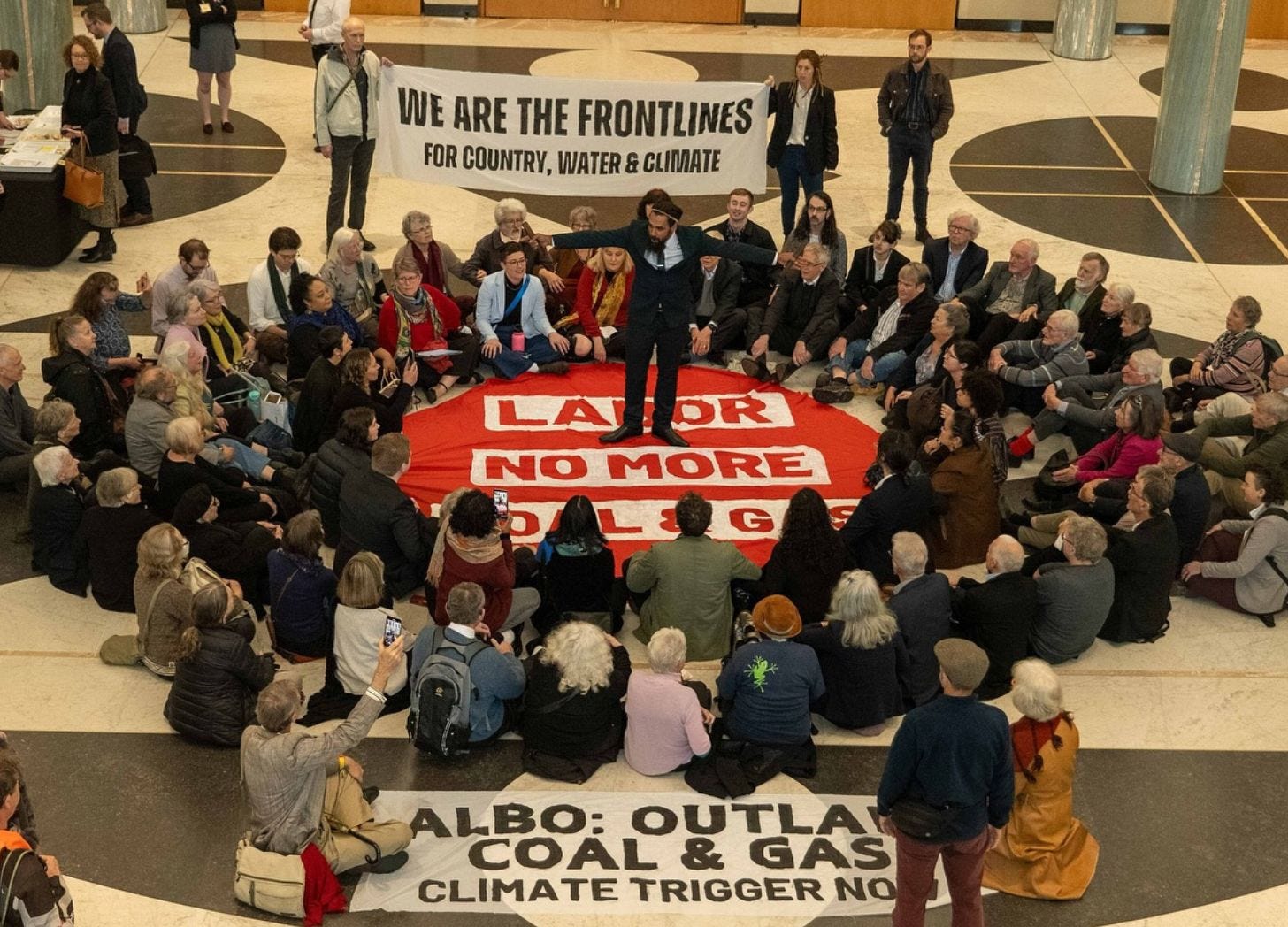Australia's Export Pollution Secret
Shocking new reports reveal the scale of pollution exported from Australia by coal and gas giants.

A handful of politicians, billionaire media moguls and fossil fuel industry-seeded ideologues like to argue that Australia makes no real difference to global climate damage.
But two gobsmacking new reports released this week by the Australian Climate Accountability Project and Climate Analytics blow that fantasy right up.
Hold onto your seat and read the next sentence twice.
Big multinational corporations export more fossil fuel pollution from Australia than from any country except Russia.
That’s right. Coal and gas giants make Australia the second largest export polluter in the world.
The new analysis reveals that these companies make Australia a bigger exporter of pollution than Saudi Arabia, the United States and every OPEC country. And Australia’s exported pollution is between three and four times larger than its domestic pollution.
That’s why First Nations and Pacific leaders and flood and fire survivors sat down in the lobby of Parliament House this week to call for a “climate trigger” law to assess new coal and gas projects.

Community members can see the obvious truth that whichever way you add it up, the impact of corporate fossil fuel pollution from Australia is massive.
Climate Analytics also calculates total lifecycle pollution of all fossil fuel production (not just exports), revealing that the five worst polluters by this measure are China, USA, Russia, Saudi Arabia and Australia, in that order. Every other country in the world pollutes less, including India.
The corporations profiting from exporting coal and gas from Australia are large multinationals that employ relatively few people and pay barely any tax. Teachers pay more tax than the oil and gas industry.
The silver lining to this dark, polluting cloud is that Australia has incredible capacity and wealth to lead a transition. There are no excuses. If only our elected representatives can stand up to the fossil fuel lobby.
No policy to phase out fossil fuel exports
Right now, the Australian Government has no policy to restrict, cap or limit corporations’ fossil fuel exports. They are still approving major new coal and gas projects, almost entirely for export, with no limits on production.
“Incredibly, Australia has no plan for limiting or reducing the exports that are escalating dangerous climate change for its own population,” says Australian Climate Accountability Project lead, Gillian Moon.
“We need to urgently develop our plan for a managed national phase-out of the exports – just as we’re doing for our domestic emissions.”
The Federal Government is giving giant gas corporations like Woodside and Santos and coal behemoths like Glencore and Whitehaven open playing fields, free uniforms, free kicks, and publicly funded sausages at halftime.
These policies give an assurance to the world that Australia’s coal and gas supply is abundant and unconstrained. They help maintain lower coal and gas prices globally, encouraging ongoing consumption. And they send a cogent signal to the world that Australia intends to produce as much coal and gas as it can sell, for as long as possible. Coming from a stable, major fossil fuel-exporting country like Australia, such reliable assurances weaken climate ambition throughout the world during this critical decade.
Under current government policies, Climate Analytics says pollution from fossil fuels from Australia would increase by 50% over the next decade. This is incompatible with the Paris Agreement goal of limiting heating to 2°C, and preferably to 1.5°C.
There is a painful and obvious disconnect between loudly trumpeted policies to promote clean energy and non-existent policies to rein in fossil fuel exports.
Wherever they’re burned, fossil fuels harm people
For too long, fossil fuel CEOs and a handful of politicians in high-polluting countries like Australia have divided people with lies about the possibility for change, while they push business as usual.
The analysis released this week shows the truth about the extent of damage fossil fuel exports from Australia cause to our air and oceans, to climate ambition globally, and to people.

It doesn’t matter which country burns the coal and gas, because here on Gaia, we all share the same atmosphere. Exports from Australia burned in Japan still harm people in Australia. Climate pollution harms people everywhere.
The systems we rely on for everyday life – like hospitals, roads, housing, food and water – are exposed to escalating and compounding unnatural weather. And people who have contributed least to the problem pay the highest price.
Australia’s actions matter globally
Almost two-thirds of Australia’s fossil fuel exports go to Japan, Korea and Taiwan – which are wealthy, developed countries with strong technological capacity.
Japan funds Australian export projects with public money and on-sells Australian gas to other countries, undermining the transition to clean energy in Asia.

The Albanese government urgently needs a national plan to phase-out fossil fuel exports in an orderly, cooperative, fast, fair, and inclusive way. Unless they begin this process, Australia’s actions and policies will not be consistent with the Paris Agreement’s temperature goal.
“That’s not asking Australia to abruptly stop the exports,” says Gillan Moon. “It’s asking for Australia to have a concrete and ambitious plan where we work cooperatively with affected communities and our overseas buyers towards an orderly and just phase-out of these massively polluting exports.”
“Australia is one of only a small handful of countries with the combination of huge fossil fuel resources, obvious alternatives from enviable renewables and outsized ‘soft power’ that could trigger change…”
As a social movement in the world’s second worst fossil fuel exporter, the power, creativity and persistence of the Australian climate movement matters for the whole world.
It’s our job to push our Government to have more courage and vision.
People at the front lines of climate harms, like the Indigenous and community leaders protesting in Parliament this week, are showing us how.
Back in groups speaking out for accountability on fossil fuel exports and protecting their communities from climate disasters.
Take care. And I’ll see you next week,
Kathryn




